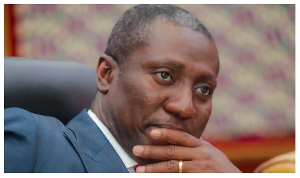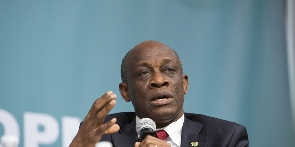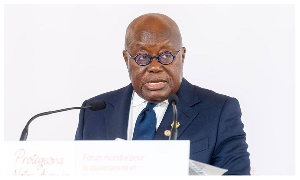Former Finance Minister Seth Terkper has questioned the basis on which the Bank of Ghana Governor notes the approval by the International Monetary Fund (IMF) of changes in the basis for calculating the budget deficit differently under the IMF programme started by the Mahama administration and continued by the current government.
Mr. Terkper stated in an interview that the Washington-based lender insisted that the then government treat the huge cost incurred in the implementation of the Single Spine Salary Structure as an exceptional cost, not a footnote.
He thus questioned the rationale behind granting the Akufo-Addo led administration – which had inherited the programme – the apparent permission to compute the fiscal deficit without the financial sector and energy sector debts.
“The excuse that these costs had to be separated because we were under an IMF progamme is not tenable. This is because even under the IMF programme, if we were looking at exceptional costs, the most significant cost before the banking bailout cost was the Single Spine, which we had to quantify and add to calculate the deficit.
Before 2016—even when we were under the IMF programme—similar to COVID, in terms of effect, we were getting out of the global financial crisis, had gas disruption leading to power crisis and [were] entering the BRIC-induced decline in crude oil price and crisis, the IMF insisted that we do zero financing.
This meant that the Bank of Ghana will not extend any facility to us. Yet that was relaxed immediately with Covid, but that was not done for us,” Mr. Terkper added.
The Former Minister’s response comes after BoG Governor Dr. Addison told journalists that Ghanaian authorities had agreed with the Bretton Woods institution to exclude the financial sector bailout and energy sector costs from the computation of the fiscal deficit.
“In 2018, when we were under an IMF programme, in order to be able to monitor the budget performance, it was important that we computed the deficit to exclude the energy and financial sectors, as those were legacy problems that we had inherited.
Now that we have finished the programme, given the developments in 2020 in the wake of the pandemic, this is the time to relook at that area—the broader fiscal deficit which includes the energy and the financial sector issues.
Over the medium term, we need to redefine the broader fiscal deficit, which gives you a better sense of the burden on the budget,” the governor explained.
While the governor, speaking at the recent Monetary Policy Committee press briefing, stated that the practice has outlived its usefulness, Mr. Terkper believes that the Fund’s action at the time was unfair.
“Ghana’s fiscal framework since the 1990s allows for the separation of exceptional revenues (e.g., divestiture and HIPC receipts) and expenditures (e.g., single spine, subsidy, road arrears), but not as footnotes,” he said.
Click to view details



Business News of Friday, 27 November 2020
Source: thebusiness24online.net
Terkper disagrees with the treatment of exceptional budget items by IMF, government
Opinions
















